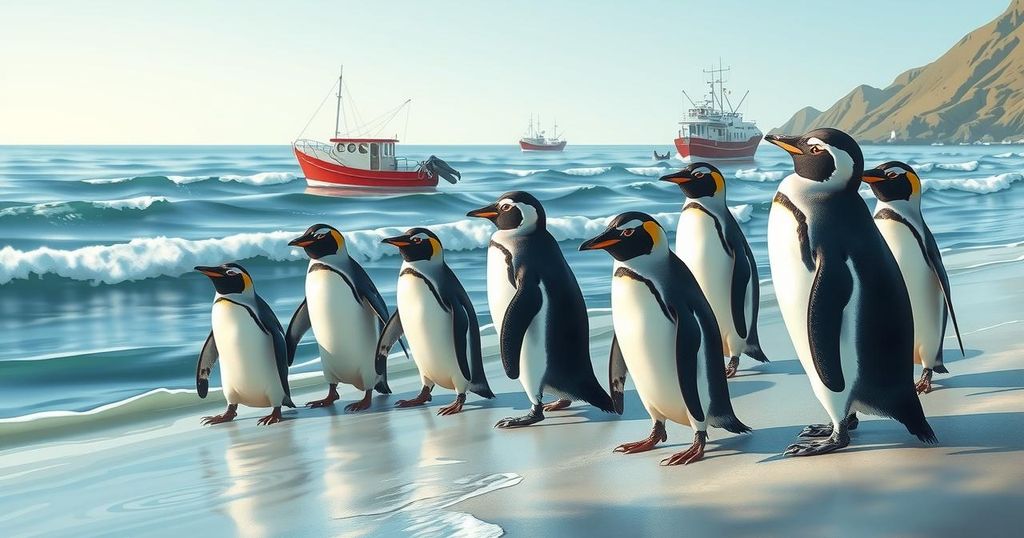Climate change
AFRICA, BIRDLIFE SOUTH AFRICA, CLIMATE CHANGE, CONNECTION, ECO - JUSTICE ORGANISATION, FOOD SECURITY, GREEN CONNECTION, INTERNATIONAL UNION FOR CONSERVATION OF NATURE, IUCN, LIZ, LIZIWE MCDAID, NEVILLE VAN ROOY, OF ENVIRONMENT, SANCCOB, SOUTH AFRICA, SOUTHERN AFRICAN FOUNDATION FOR THE CONSERVATION OF COASTAL BIRDS, SURFING, SUSTAINABILITY, UNION FOR CONSERVATION OF NATURE
Fatima Khan
0 Comments
The Green Connection Welcomes Settlement for African Penguin Protection
The Green Connection welcomes a settlement aimed at protecting the critically endangered African Penguin following a legal challenge by SANCCOB and BirdLife South Africa. This development highlights necessary actions against industrial overfishing and offshore oil threats to marine biodiversity. Local fishers express concern over declining fish populations, signaling urgent need for environmental protections. The legal victory represents a step toward safeguarding both ecological and community livelihoods in South Africa.
In a notable advance for environmental and social justice in South Africa, The Green Connection has expressed approval of the recent settlement in a legal challenge initiated by the Southern African Foundation for the Conservation of Coastal Birds (SANCCOB) and BirdLife South Africa against the Minister of Environment. This settlement aims to enhance protections for the critically endangered African Penguin, which is facing extinction. The organization emphasizes the necessity for actionable steps to tackle wider threats to marine ecosystems caused by industrial overfishing and offshore oil and gas exploitation, which significantly affect biodiversity.
Liziwe McDaid, Strategic Lead at The Green Connection, underscored the importance of healthy oceans, stating that they sustain both marine life and the livelihoods, culture, and spirituality of local communities. The declining African Penguin population serves as a stark indicator of ocean health issues. The organization advocates for strong protective measures to ensure the sustainability of marine systems vital for small-scale fishers along South Africa’s extensive coastline.
The African Penguin has recently been classified as Critically Endangered by the International Union for Conservation of Nature (IUCN), with its population declining by an alarming 76.9% in less than 20 years. The number of breeding pairs fell dramatically from approximately 27,151 in 2007 to merely 8,750 by December 2023. Neville van Rooy, Community Outreach Coordinator for The Green Connection, highlighted how industrial overfishing exacerbates extinction risks while disrupting the marine food chain, threatening the livelihoods of small-scale fishers due to compounded stresses from climate change and offshore oil exploration.
Local fishers have reported significant changes in their catches, with diminishing traditional fish species and altered diets among fish. Priscilla Abrahams, a fisher from St Helena Bay, noted the lack of anchovy in snoek stomachs, replaced by baby hake. Walter Steenkamp, an experienced fisher, lamented, “The sea isn’t the same,” signifying ongoing ecological changes impacting their communities.
The legal action emphasizes the government’s responsibility to enforce environmental protections, including establishing no-fishing zones around critical breeding habitats for penguins. The Biodiversity Law Clinic, which represents the applicants, informed that international experts reviewed relevant science and made recommendations to the Minister in July 2023.
Supporting SANCCOB and BirdLife South Africa, The Green Connection highlights that protecting the African Penguin aligns with safeguarding the rights of local fishers and coastal communities. While this legal victory is promising, it marks only a single step in the continuous fight for environmental and human rights against challenges posed by climate crisis and unsustainable practices. As South Africa confronts escalating social and environmental dilemmas, it is essential that leaders prioritize ethical stewardship over profit-oriented pursuits.
The recent settlement in the legal challenge regarding the African Penguin highlights the urgent need for stronger environmental protections in South Africa. This pivotal agreement is not only a victory for the penguin but also essential for the livelihood of small-scale fishers. Continuous advocacy and decisive action are crucial to address broader threats to marine ecosystems. The need for sustainable practices that prioritize people and the environment remains at the forefront as South Africa navigates these pressing challenges.
Original Source: allafrica.com




Post Comment